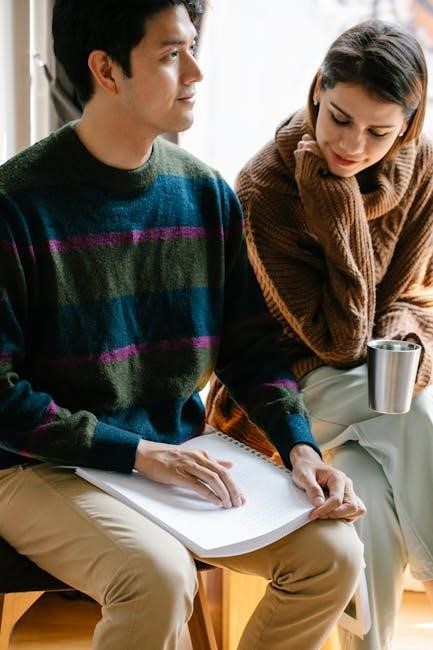This guide explores the complexities of the Black man and Black woman relationship, offering insights into historical contexts, societal influences, and pathways to mutual understanding and empathy․
It serves as a resource for fostering healthier connections within the Black community, emphasizing shared experiences and the importance of open communication․
Importance of Mutual Understanding in the Black Community
Mutual understanding between Black men and women is vital for strengthening community bonds and fostering resilience․ Historical challenges and societal stereotypes have often strained relationships, emphasizing the need for open dialogue and empathy․ By addressing these issues, individuals can work toward healing and unity, creating a foundation for collective growth and support․
Understanding each other’s experiences and perspectives helps break down barriers and promotes collaboration․ This mutual respect fosters a culture where Black men and women can thrive together, addressing shared challenges and celebrating shared successes․ It is through this lens that the Black community can build a stronger, more united future․

Historical Context of the Black Man and Black Woman Relationship
The relationship between Black men and women is deeply rooted in shared experiences of slavery, segregation, and systemic racism, shaping their collective struggle and resilience over centuries․
The Impact of Slavery and Racial Oppression
Slavery and racial oppression have profoundly shaped the dynamics between Black men and women, leaving deep scars that resonate through generations․
Historical trauma, forced separation, and systemic dehumanization disrupted family structures and trust, fostering long-term emotional and psychological wounds․
The legacy of these injustices continues to influence relationships, often manifesting as mistrust, resentment, and disconnection․
Understanding this painful history is crucial for healing and rebuilding connections within the Black community․
By acknowledging the past, both Black men and women can work toward mutual understanding, fostering stronger, healthier relationships rooted in empathy and shared resilience․
Societal Stereotypes and Their Effects
Societal stereotypes have long perpetuated harmful narratives about Black men and women, contributing to fractured relationships and misunderstandings․
These stereotypes, often rooted in racism and misogyny, portray Black women as “angry” or “hypersexual” and Black men as “aggressive” or “irresponsible․” Such labels dehumanize individuals and create mistrust․
Media and cultural depictions frequently amplify these biases, reinforcing division and conflict within the Black community․
The emotional toll of these stereotypes can lead to feelings of disrespect and diminished value, further hindering mutual understanding and connection․
Addressing these biases requires a collective effort to challenge and dismantle harmful narratives, fostering a culture of empathy and respect․

Understanding the Black Woman’s Experience
The Black woman’s experience is deeply rooted in resilience and historical trauma, shaped by societal marginalization and systemic oppression, yet marked by unwavering strength and perseverance․
Historical Trauma and Its Lasting Effects
Historical trauma, rooted in centuries of slavery, racial oppression, and systemic marginalization, has left an indelible mark on the Black woman’s experience․ The legacy of forced separation, violence, and dehumanization continues to resonate, affecting mental, emotional, and societal well-being․
These experiences have shaped cultural identity, family dynamics, and community relationships, often manifesting in intergenerational pain and resilience․ Understanding this history is crucial for fostering empathy and healing within the Black community, as it acknowledges the profound impact of the past on present-day realities․ By confronting these traumas, Black men and women can work together to rebuild trust, strengthen bonds, and create a more supportive and equitable future․
Modern-Day Challenges and Resilience
Modern-day challenges faced by Black women include societal stereotypes, economic disparities, and gendered racism, which intersect to create unique obstacles; Despite these hurdles, Black women consistently demonstrate remarkable resilience, adaptability, and strength․
The ability to thrive amidst adversity is rooted in cultural identity, communal support, and personal determination․ By addressing these challenges head-on, Black women continue to redefine their roles and contributions to society․ Understanding these contemporary struggles is essential for fostering solidarity and mutual respect within the Black community, as it highlights the importance of collective action and empowerment․ Resilience, in this context, is not just survival but a powerful form of resistance and transformation․
Key Themes in “The Blackman’s Guide to Understanding the Blackwoman”
The guide explores themes of mutual understanding, historical context, societal stereotypes, and communication, emphasizing the importance of empathy and collaboration in fostering healthier relationships within the Black community․
Author Shahrazad Ali’s Perspective
Shahrazad Ali’s work, The Blackman’s Guide to Understanding the Blackwoman, offers a controversial yet thought-provoking exploration of Black gender dynamics․ Ali emphasizes the importance of mutual respect, communication, and empathy in fostering healthier relationships․ Her perspective highlights the historical and societal challenges faced by Black men and women, urging a return to cultural roots and shared values․ Ali critiques societal stereotypes and encourages Black men to take an active role in understanding and supporting Black women․ While her views have sparked debate, they remain a significant contribution to discussions on Black relationships and empowerment․ Her approach blends historical context with practical advice, aiming to bridge gaps and strengthen connections within the Black community․
Core Principles for Building Healthy Relationships
Building healthy relationships requires mutual respect, trust, and open communication․ Shahrazad Ali emphasizes the importance of understanding each other’s experiences and perspectives․ Key principles include fostering empathy, actively listening, and addressing conflicts constructively․ Both partners must prioritize emotional support and shared goals․ Respect for individuality and cultural identity is crucial․ Ali advocates for a foundation of honesty, transparency, and accountability․ By nurturing these principles, Black men and women can cultivate stronger, more meaningful connections․ These guidelines encourage personal growth and collective empowerment, ensuring relationships thrive amid life’s challenges․ The focus is on creating a supportive environment where both partners feel valued and understood․

The Role of Communication in Relationship Building
Effective communication is vital for fostering understanding and connection․ Open dialogue, active listening, and empathy are essential in navigating challenges and building trust between Black men and women․
Clear expression of thoughts and feelings strengthens bonds and promotes mutual respect, creating a foundation for resilient and meaningful relationships․
Active Listening and Empathy
Active listening and empathy are foundational for understanding the Black woman’s experience․ By truly hearing her perspective without interruption or judgment, Black men can foster deeper connections․
Empathy allows for shared emotional understanding, bridging gaps created by societal stereotypes and historical trauma․ It encourages mutual respect and validates her experiences, creating a safe space for open dialogue․
Such practices dismantle barriers and promote unity, enabling both partners to grow together, strengthened by their shared humanity and cultural bond․
Navigating Conflict and Misunderstandings
Navigating conflict and misunderstandings requires patience, understanding, and a willingness to address issues openly․ Both partners must acknowledge each other’s experiences and perspectives․
Historical and societal challenges often influence interactions, making it crucial to approach conflicts with empathy and without assumptions․
By fostering an environment of openness and mutual respect, Black men and women can resolve disagreements constructively, strengthening their bond and fostering unity․
This process not only addresses immediate issues but also builds a foundation for long-term understanding and growth within the relationship․

Mutual Respect and Empathy
Mutual respect and empathy are foundational for understanding and harmony between Black men and women․ These values foster unity and appreciation of shared experiences, strengthening relationships․
Breaking Down Stereotypes and Biases
Breaking down stereotypes and biases is essential for fostering mutual understanding between Black men and women․ Societal portrayals often perpetuate harmful stereotypes, such as the “angry Black woman” or the “emasculated Black man,” which can create division and mistrust․ These narratives, rooted in historical oppression and systemic racism, distort authentic communication and connection․
Shahrazad Ali’s work emphasizes the need to challenge these biases by acknowledging the shared history of racial oppression and its lasting effects․ By questioning preconceived notions and engaging in open dialogue, individuals can move beyond stereotypes and build genuine empathy․ This process requires self-reflection, education, and a willingness to confront uncomfortable truths, ultimately paving the way for healthier, more respectful relationships․
Fostering a Culture of Support and Collaboration
Fostering a culture of support and collaboration is crucial for strengthening relationships between Black men and women․ This involves creating spaces where both parties feel valued, heard, and empowered to contribute equally․ By prioritizing mutual respect and shared goals, individuals can build trust and work together to address societal challenges․
Shahrazad Ali’s work highlights the importance of collaboration in overcoming historical and modern-day obstacles․ Through open dialogue and collective efforts, Black men and women can dismantle barriers and create a foundation for lasting unity․ This collaborative approach not only enhances personal relationships but also strengthens the broader Black community, fostering a sense of solidarity and shared progress․
Embracing mutual understanding and unity is key to fostering healthier relationships and collective growth․
Seek knowledge, reflect, and act to strengthen bonds within the Black community․
The Path Forward for Black Men and Women
Building a harmonious future requires unity, open dialogue, and mutual respect․ Black men and women must collaborate to dismantle stereotypes and biases, fostering a culture of understanding․
Education and self-reflection are crucial for healing historical wounds and addressing contemporary challenges․ By embracing shared experiences and strengths, the community can thrive․
Empowerment through knowledge and collective action will pave the way for a brighter, more equitable future․ Encouraging open communication and active listening can bridge gaps and strengthen relationships․
Ultimately, the path forward lies in unity, education, and a commitment to supporting one another in achieving common goals․
Resources for Further Learning and Growth
For those seeking deeper understanding, numerous resources are available, including Shahrazad Ali’s The Blackman’s Guide to Understanding the Blackwoman and its companion piece, The Blackwoman’s Guide to Understanding the Blackman․
These texts provide foundational insights into the dynamics of Black relationships and societal influences․ Additionally, free PDF downloads and online forums offer accessible tools for learning and growth․
Books like The Black Woman Redefined and Black, White, and Green further explore cultural and societal contexts․
Engaging with these materials fosters empathy, challenges stereotypes, and promotes unity within the Black community, encouraging personal and collective development․


